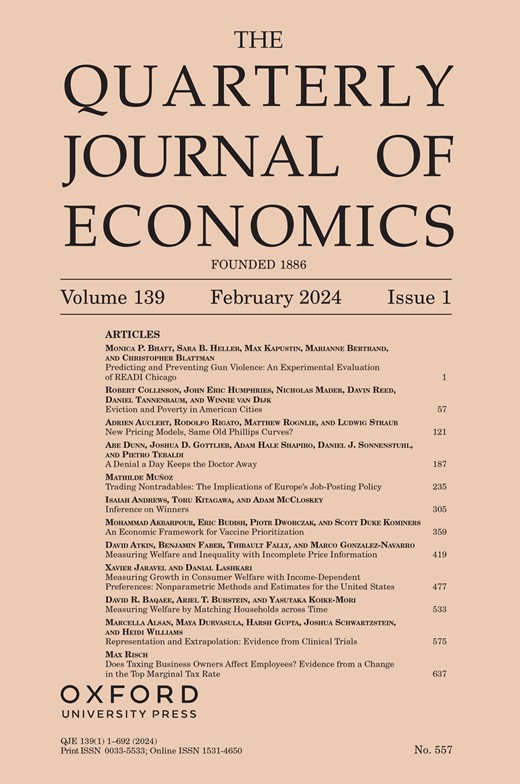Imperfect Risk Sharing and the Business Cycle
IF 12.7
1区 经济学
Q1 ECONOMICS
引用次数: 1
Abstract
Abstract This article studies the macroeconomic implications of imperfect risk sharing implied by a class of New Keynesian models with heterogeneous agents. The models in this class can be equivalently represented as a representative-agent economy with wedges. These wedges are functions of households’ consumption shares and relative wages, and they identify the key cross-sectional moments that govern the impact of households’ heterogeneity on aggregate variables. We measure the wedges using U.S. household-level data and combine them with a representative-agent economy to perform counterfactuals. We find that deviations from perfect risk sharing implied by this class of models account for only 7% of output volatility on average but can have sizable output effects when nominal interest rates reach their lower bound.不完全风险分担与商业周期
摘要本文研究了一类具有异质主体的新凯恩斯模型所隐含的不完全风险分担的宏观经济含义。这类模型可以等效地表示为带有楔形的代表-代理经济。这些楔形是家庭消费份额和相对工资的函数,它们确定了控制家庭异质性对总变量影响的关键横截面时刻。我们使用美国家庭层面的数据来测量楔形,并将它们与代表性代理经济相结合,以执行反事实。我们发现,这类模型所隐含的与完全风险分担的偏差平均只占产出波动的7%,但当名义利率达到其下界时,可能会产生相当大的产出影响。
本文章由计算机程序翻译,如有差异,请以英文原文为准。
求助全文
约1分钟内获得全文
求助全文
来源期刊

Quarterly Journal of Economics
ECONOMICS-
CiteScore
24.20
自引率
2.20%
发文量
42
期刊介绍:
The Quarterly Journal of Economics stands as the oldest professional journal of economics in the English language. Published under the editorial guidance of Harvard University's Department of Economics, it comprehensively covers all aspects of the field. Esteemed by professional and academic economists as well as students worldwide, QJE holds unparalleled value in the economic discourse.
 求助内容:
求助内容: 应助结果提醒方式:
应助结果提醒方式:


